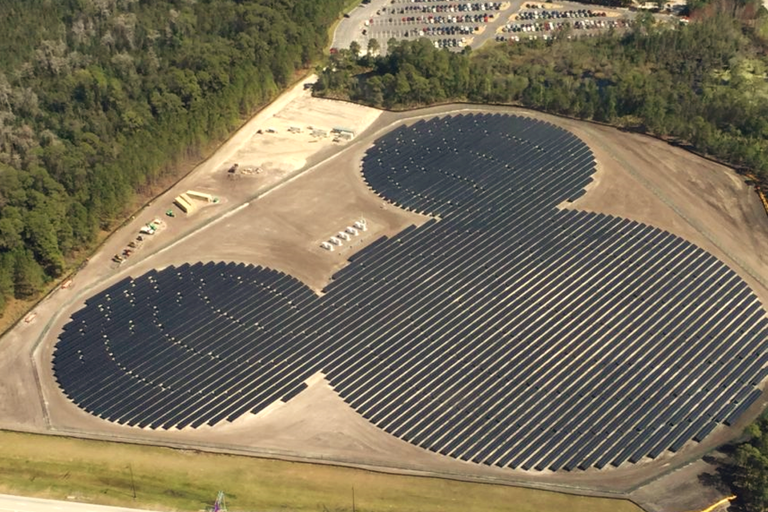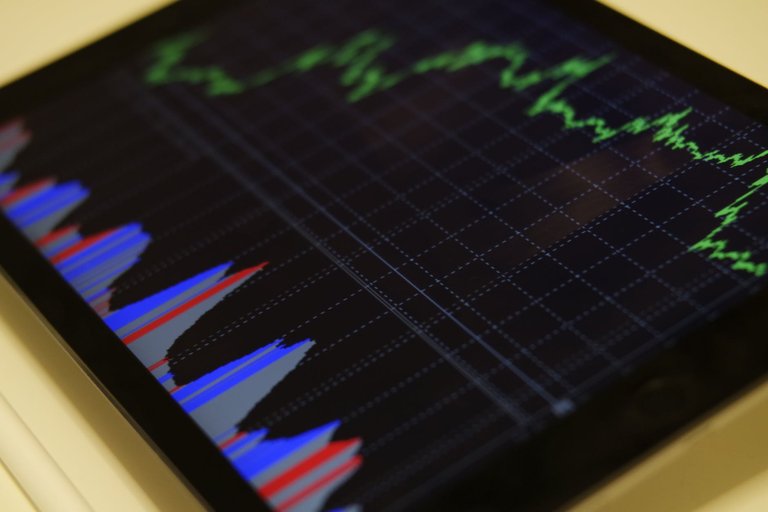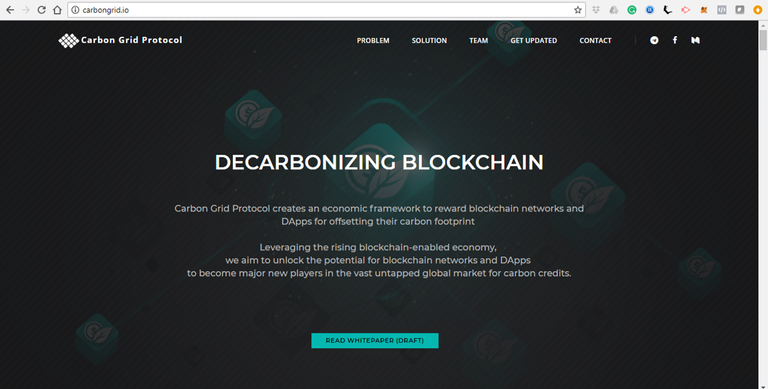
Have you ever heard of carbon credits before?
If you have... but never have seen one, I don't blame you.
Why?
Because carbon credits is a game played only by large entities in the energy markets. It is not accessible to the common person on the street.
To dive deeper, we first need to understand...
What are carbon credits?
A carbon credit is a reward certificate issued each time you have prevented 1,000 kg of carbon emissions from entering into the atmosphere.
However, because carbon emissions are invisible, the only way you can claim a carbon credit is by going through a lengthy process of verification to demonstrate that your actions have resulted in the reduction. That is why carbon credits are only awarded through centralized authorities and for large initiatives only. Such as:
Disney

Can you spot the Hidden Mickey?
On February 2016, Disney commissioned a 48,000 solar panel system over a 22-acre plot of land right outside DisneyWorld Orlando, Florida. The solar panels not only help power the theme park but the hotels around the area as well (approximately 5 million kWh/year).
Estimated CO2 emissions saved:
3 million / year
Estimated Carbon Credits gained:
+ 3,000 credits / year
Microsoft

In February 2018, Microsoft achieved its goal to power 50% of its computer servers worldwide using clean energy by purchasing bulk renewable energy from developers directly; which in total represents a supply of approximately 1.1 billion kWh/year.
Estimated CO2 emissions saved:
660 million kg / year
Estimated Carbon Credits gained:
+ 660,000 / year

Google too, purchases renewable energy at the wholesale level (approximately 7 billion kWh/year) but enough to power ALL their computer servers, operation centers and offices around the world. Google is currently the largest corporate renewable energy buyer in the world.
Estimated CO2 emissions saved:
4.2 billion kg / year
Estimated Carbon Credits gained:
+ 4.2 million / year
So what do you do with these carbon credits?
These certificates are then tradable and often sold to large carbon contributors (a polite way of labelling polluters) to offset the carbon emissions caused by their activities. In short, people buy carbon credits for only two reasons:

You want to show support to those who have done the deed; and you want people to see you doing so.
You are forced to buy it if your business operations exceed the carbon emissions limits set by your regulator.
Over 195 countries are signatories to the Kyoto Protocol and Marrakesh Accords, which basically has set the frameworks and market mechanics for carbon credit trading.
If your factory is putting out 100,000 kg of carbon emissions each year whereas your government has enacted a law that limits any business from producing no more than 80,000 kg each year, you will need to buy 20 carbon credits to offset the excess according to the law. Those carbon credits are then exhausted and recorded as a cost item of doing business in the balance sheet. It has no more use.
The Current State of Carbon Credits
I was at one of the local crypto meetups organised by Stellar yesterday evening.
There I met Sharon Paul, the COO of a blockchain startup called CarbonGrid.

Here is what I learned:
There are currently MORE carbon credits in supply than there is demand.
In short, few people are buying carbon credits. I wonder why. Is enforcement lacking?
Carbon credits are currently a brokers' market. Due to the centralized nature of carbon credit trading, brokers tend to behave as kingmakers in this space as they are the gatekeepers who determine whether your carbon credits will meet a buyer... and at a margin advantageous to them of course.
CarbonGrid is an attempt to create an easy-to-use marketplace that enables anyone with a smartphone and Internet connection to purchase and sell carbon credits; without an annoying middleman.

Final Thoughts
Carbon credits is also a man-made token... isn't it? Except for the fact that it isn't blockchain based.
It is interesting that CarbonGrid is building a decentralized platform and marketplace for carbon credit trading.
I acknowledge that they might succeed in solving the accessibility issue that traditionally mired this area. However, I currently do not see how does by creating this platform create further demand for carbon credits.
If you had money to spare, wouldn't you prefer to use it to fund new green initiatives?
Why re-invest in the past efforts (unless you're a polluter)?
Why buy carbon credits?
Buzz

Hi, my name is Jason aka @buzz.lightyear. I envision a future where renewable energy is our main source of electricity in this lifetime; reducing the largest contributor of carbon emissions by 90% and bringing our global temperatures back to its natural balance.
I believe that this is no easy task but it is achievable with your support.
I am developing an open blockchain that incentivises both producers and consumers of renewable energy and am looking to collaborate with brilliant minds who share this vision so that we can create a future where it just makes sense to go 100% renewable, visit your local store, buy some latest tech and generate energy for your own use and for others.
This article explains a lot of questions I had in mind. Spot on and informative enough. Strong effort, keep it up buzz lightyear :)
thanks for this post.. great information and its good to know what is going on with some of the GIANT companies.. GO GOOGLE! <3
I have sent $1 SBD to upvote this post as part of my pay it forward minnow support initiative.. I hope this encourages you to keep writing amazing posts and making this world a better place!.
Thank you from me, the @ecotrain and @tribesteemup!
JOIN US ON DISCORD
https://discord.gg/XwAmRWW
From my research, I feel that the big companies sometimes do get a bad rap for no reason.Thanks @eco-alex. I write as I learn.
There is something within me that needs healing... an assumption that the rich and powerful is something I need to always fight against. That they do not care. That it is all for show.
I realise now that I am wrong.
There is no reason for them to go through lengths to buy renewable energy. But they do.
I'm very happy to be wrong in this regard.
wow this is very good! You have my upvote. I also reviewed your whitelist application in minnowbooster. Once you have been approved you might want to use MB instead of Appreciator. The profitability is much more higher . Good luck!
Hi @ladydiana thanks for the compliment. Can u tell me more about minnowbooster?
To the question in your title, my Magic 8-Ball says:
Hi! I'm a bot, and this answer was posted automatically. Check this post out for more information.